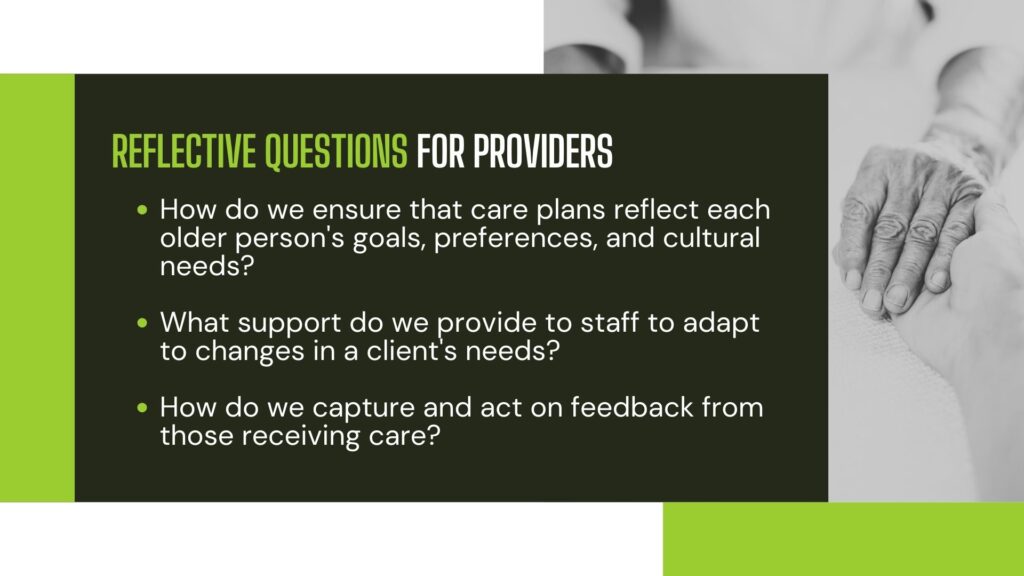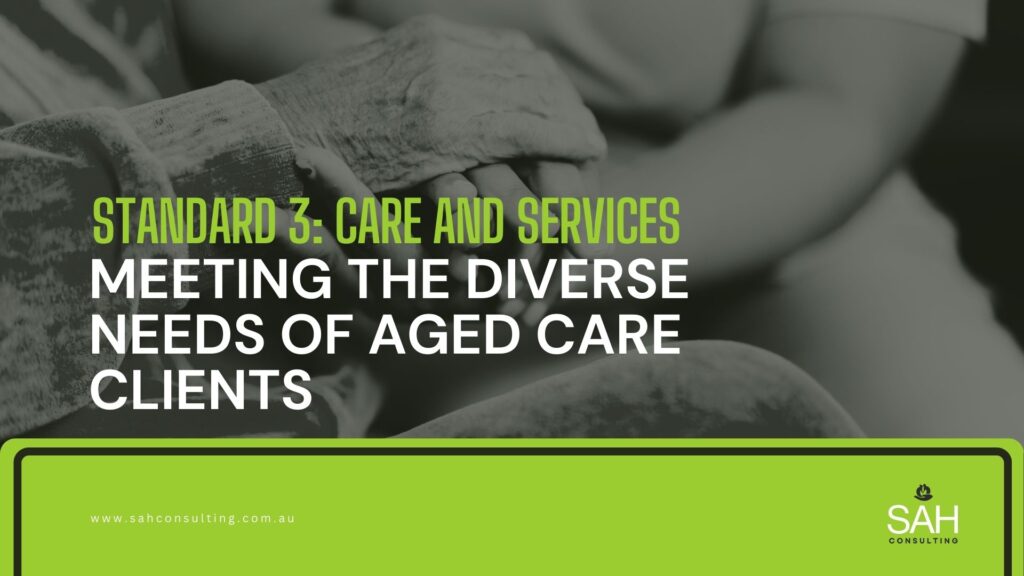The Support at Home Program, launching in 2025, marks a significant reform in Australia’s aged care sector. This article continues our detailed exploration of the Strengthened Aged Care Quality Standards, focusing on Standard 3: Care and Services. This standard outlines how providers must deliver care that is individualised, respectful, and holistic, ensuring that the diverse needs, including cultural needs in aged care, of older Australians are met.
What Standard 3 Means
Standard 3 emphasises the importance of tailoring care and services to each individual’s unique needs, preferences, and goals. It recognises the older person’s right to take risks and their role as active partners in planning and receiving care. This standard applies to providers in Categories 4, 5, and 6 under the Support at Home Program.
From the perspective of older people: “I am treated as an individual, and my care and services meet my unique needs.”
From the perspective of workers: “I understand the needs and preferences of the people I care for and deliver services that respect their individuality.”
Key Topics and Principles
Standard 3 encompasses several critical areas:
- Dementia-specific care: Implementing systems to assess and support individuals living with dementia, recognising their skills and strengths.
- Monthly care statements: Providing regular, transparent updates to older people about their care and services.
- Holistic and person-centred approaches: Addressing not only clinical needs but also emotional, cultural, and social well-being.
- Preventative and restorative care: Promoting independence and supporting recovery after illness or injury.
- Supporting autonomy and risk-taking: Respecting the choices of older people, even when those choices involve risk.
- Multidisciplinary care: Coordinating across various disciplines to provide comprehensive support.
These principles ensure that care is not only effective but also respectful of each individual’s needs.
Required Outcomes and Actions
Standard 3 comprises four outcomes supported by 22 actions, two of which introduce new expectations.
Outcome 3.1: Assessment and Planning
Effective, individualised assessment and planning processes ensure care and services are tailored to the older person’s needs, goals, preferences, and wellbeing.\
Actions:
- Implement a system to assess needs, goals, risks, and manage care delivery.
- Ensure ongoing communication and partnership in assessment and planning.
- Communicate outcomes of assessment and planning clearly to individuals and supporters.
- Individualise care plans, ensuring they reflect the individual’s needs and preferences.
- Regularly review care plans to account for changes in needs or circumstances.
- Support advanced care planning and the nomination of decision makers.
Outcome 3.2: Delivery of Care and Services
Care and services must promote independence and dignity, maintain function, and meet cultural and individual needs through evidence-based practices.
Actions:
- Provide culturally safe, trauma-aware care based on evidence-based practices.
- Optimise quality of life, reablement, and function aligned with preferences.
- Support safe use of equipment, aids, and devices.
- Refer individuals for early intervention and support, as needed.
- Train workers to recognise risks and respond to changes in health.
- Implement strategies for dementia care, focusing on strengths and partnership.
- Minimise restrictive practices and ensure they’re used as a last resort.
- Involve individuals in selecting their care workers and ensure continuity.
- Train workers to understand diverse communication needs.
Outcome 3.3: Communicating for Safety and Quality
Clear, transparent communication ensures safe, quality care delivery, particularly during transitions or deterioration in health.
Actions:
- Ensure structured communication of critical information to all care providers.
- Use communication systems for changes in care, risks, or transitions.
- Implement escalation processes for health and safety concerns.
- Correctly match individuals to services and provide care statements.
Outcome 3.4: Coordination of Care and Services
Coordination across care providers ensures comprehensive and seamless care delivery, focusing on partnership and continuity.
Actions:
- Identify and coordinate care partners for continuity and effective service.
- Recognise and involve supporters as partners in care coordination.
- Facilitate smooth transitions of care in collaboration with individuals and providers.
Demonstrating Conformance
To demonstrate compliance with Standard 3, providers should focus on the following areas:
Documented Systems and Processes
Maintain clear policies and procedures outlining how care is assessed, planned, delivered, and reviewed. These documents should reflect the organisation’s commitment to meeting the cultural needs in aged care.
Workforce Capability and Support
Ensure that staff are trained in person-centred care, cultural safety in aged care, and dementia-specific support. Regular evaluations and professional development plans should be in place to maintain high standards.
Client-Centred Monitoring and Feedback
Implement systems to regularly review care plans with older people, incorporating their feedback to improve services continually. This process ensures that care remains aligned with the individual’s evolving needs and preferences, fostering a collaborative approach to service delivery.
Quality Improvement and Governance
Use data from feedback, incident reports, and performance metrics to inform quality improvement initiatives. The governing body should be actively involved in overseeing care quality and ensuring that cultural diversity in aged care is respected and promoted.
Reflective Questions for Providers
Providers should consider the following questions to assess their alignment with Standard 3:
- How do we ensure that care plans reflect each older person’s goals, preferences, and cultural needs?
- What support do we provide to staff to adapt to changes in a client’s needs?
- How do we capture and act on feedback from those receiving care?
Reflecting on these questions can help providers identify areas for improvement and ensure that their services are culturally safe and responsive.

SAH Consulting: Simplifying Support at Home Registration
At SAH Consulting, we assist aged care providers across Australia in navigating the Support at Home registration process. Our expertise lies in ensuring compliance with the Strengthened Quality Standards, particularly Standard 3.
We offer services including compliance audits, policy development, and registration support. Our team understands the importance of addressing cultural needs in aged care and works closely with providers to develop culturally safe and inclusive care systems.
Final Thoughts
Standard 3 is not merely a compliance requirement; it is a framework for delivering meaningful, person-focused care that respects the cultural needs in aged care. By embracing this standard, providers can enhance the quality of life for older Australians while ensuring their cultural needs are addressed.
Need help navigating registration or improving quality standards? SAH Consulting is here to guide you, ensuring your aged care services meet all the requirements and enhance the experience for those in your care. Let’s make your journey smoother—contact us for a free consultation!
